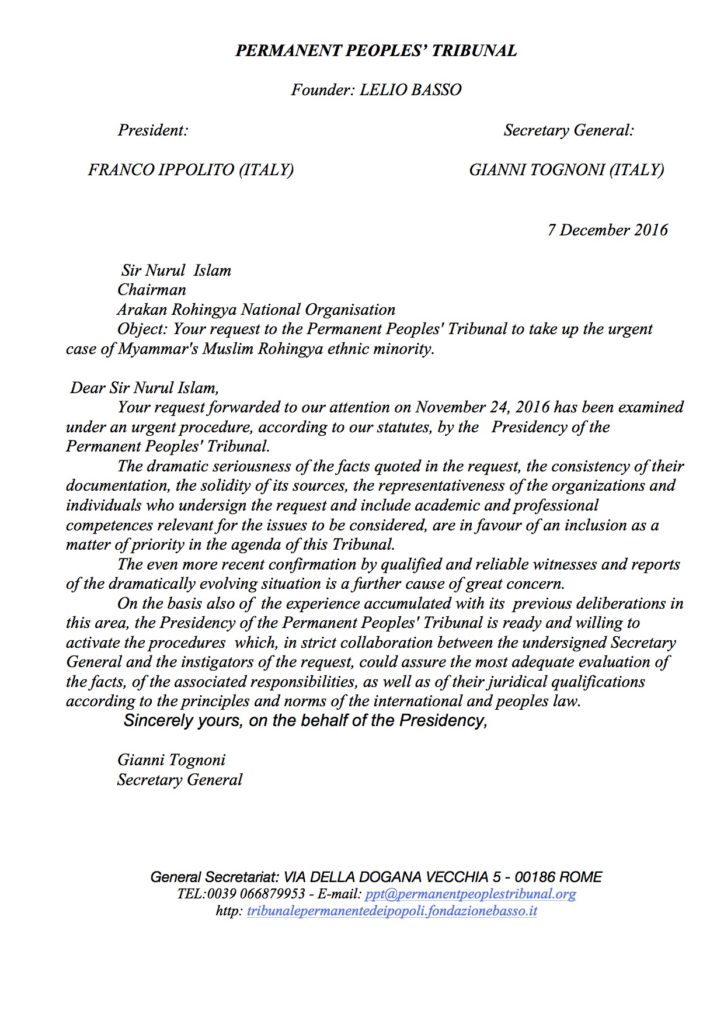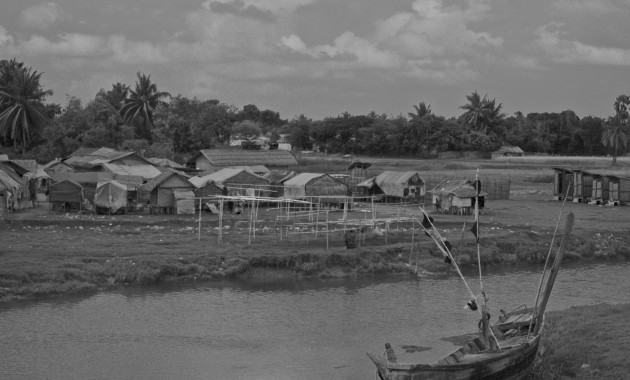Permanent Peoples’ Tribunal (Rome) Takes Up ‘Urgent Case’ of Myanmar’s Rohingya
HUMAN RIGHTS, ASIA--PACIFIC, JUSTICE, 19 Dec 2016
International State Crime Initiative – TRANSCEND Media Service
 PPT is in keeping with this People-centered Justice, as opposed to Power-dictated “justice”.
PPT is in keeping with this People-centered Justice, as opposed to Power-dictated “justice”.
See original request letter below, submitted on 24th November 2016: Rohingya Tribunal Request to Permanent Peoples’ Tribunal
24 November 2016
Mr Franco Ippolito, President
Dr Gianni Tognoni, Secretary General
Ms Simona Fraudatario, Coordination
The Permanent Peoples’ Tribunal
Fondazione Lelio e Lisli Basso
Via della Dogana Vechia 5
Rome, Italy
Dear Mr Ippolito, Dr Tognoni and Ms Fraudatario,
We, the undersigned group of researchers, academics, and activists, in coalition with global Rohingya refugees, hereby request that the Permanent Peoples’ Tribunal (PPT) take up the urgent case of Myanmar’s Muslim Rohingya ethnic minority. We make this request in response to the well documented unfolding and escalating genocide in Rakhine state, Myanmar.
We ask that the Tribunal examine the current crisis in the context of historical evidence of recurring patterns of persecution by the Myanmar state against the Rohingya, that have precipitated at least three waves of mass exodus since the 1970s.
We make this request on the basis of compelling evidence of ongoing: widespread institutional discrimination; state sponsored hate crime; mass killings; mass sexual violence; wholesale destruction of communities and neighbourhoods; massive forced displacement; apartheid structures of segregation; targeted population control; state denial of Rohingya identity; forced labour; denial of access to livelihood, healthcare, freedom of movement, and food. Evidence of these genocidal violations, with blanket impunity, is to be found in the extensive and systematic research conducted by a range of academic and human rights organisations (Green, MacManus and de la Cour Venning, ISCI, 2015; Zarni and Cowley, 2014; Fortify Rights, 2015; Human Rights Watch, 2012, 2013; ASEAN, 2015).
In October/November 2016, evidence of a new reign of terror and wholesale destruction of communities exercised by the Myanmar state against the Rohingya population has emerged. This month, we have received evidence of widespread killings, curfews, rape and arson in Northern Rakhine State (NRS), the worst affected area. All on-the-ground reports paint a picture of a terrified Rohingya community trapped in their homes, unable to access food, health services or livelihoods. NRS is an information ‘black hole,’ with travel to the region tightly restricted by the Myanmar authorities.
In spite of rare UN Security Council Meetings to discuss the violence against the Rohingya people, the international community has thus far failed to take any meaningful action to intervene and end the genocide. International institutions of global justice such as the ICC, the UN Security Council and ASEAN have failed to act in the face of robust evidence of genocide.
The election of the National League for Democracy (NLD) in 2015 was met with much global optimism. However, Aung San Suu Kyi has simply entrenched the persecution of the Rohingya; indeed, this year she demanded foreign governments refrain from using the term ‘Rohingya.’ Disturbingly, Aung San Suu Kyi’s government has chosen to ignore the criminal nature of state policies toward the Rohingya. The Myanmar government in public statements continues to deny the existence of the Rohingya identity. Meanwhile, the establishment in August 2016 by the Myanmar government of a high-level commission, headed by former UN Secretary-General, Kofi Annan, has been welcomed by many as a move in the right direction. Civil society actors are, however, deeply skeptical about the Commission’s potential to effect real change for the Rohingya. Crucially, the Commission has been instructed to operate within the framework of the 1982 Citizenship Law, which effectively excludes the Rohingya from the rights of citizenship.
Many are concerned that the Commission does not adequately represent the Rohingya community – indeed, it does not have a single Rohingya on it. Of great concern also is the fact that one of the three Rakhine members, Saw Khin Tint, has openly rejected the existence, identity and history of the Rohingya people, both in her public speeches and in writing. Myanmar’s own Human Rights Commisssion has also refused even to acknowledge the existence of the victim group and the domestic criminal justice process is itself an instrument of persecution.
The Tribunal would provide an arena in which to: establish the facts, inform the public, preserve collective memory, and protect against the rewriting of history. It will challenge the silence of states and international institutions, and pressure them to fulfill their international human rights obligations. In addition, we see the Tribunal as a vehicle through which to inform and strengthen civil society, and foster international solidarity to end this persecution.
We request that the Tribunal move beyond narrow legal paradigms, the application of which is determined by the political calculations of key UN member states. Instead, we urge the Tribunal to draw on increasingly recognized criminological frameworks for apprehending state crime and genocide, being sensitive to the spirit of Raphael Lemkin’s intention behind the UN Genocide Convention (1948).
We would welcome the participation of any other state persecuted ethnic groups inside Myanmar at any stage of the proceedings.
Holding the People’s Tribunal at this time would enable civil society to leverage the renewed media and political attention now focused on the situation of the Rohingya in Rakhine state. Priority focus areas for potential impact include: 1) intervention in, and potential mitigation of, an unfolding process of genocide; 2) shifting the debates and public understanding around the persecution of the Rohingya from one of ‘humanitarian crisis,’ development and ‘inter-communal’ violence to one of ‘genocide,’ and serious human rights violations with a key focus on the criminality of the Myanmar state.
Initiators:
Rohingya Youth Development Forum (RYDF), Arakan-Burma
Rohingya Youth Initiative Canada (RYIC)
European Rohingya Council (ERC)
Burma Human Rights Network
Rohingya Community Netherlands (BRCNL)
Burmese Rohingya Community, Denmark (BRCD)
Rohingya Organisation Norway
Swedish Rohingya Association (SRA)
Canadian Burmese Rohingya Organisation (CBRO)
Rohingya Intellectuals Community, Australia (RICA)
Burmese Rohingya Community in Australia (BRCA)
Burmese Rohingya Associate, Queensland (BRAQA)
Arakan Rohingya National Organisation (ARNO)
Rohingya Arakanese Refugee Committee, Malaysia
Burmese Rohingya Association in Japan (BRAJ)
Rohingya Advocacy Network in Japan (RANJ)
Social Welfare Society for Development (SWSD), Chittagong, Bangladesh
British Rohingya Organisation UK (BROUK)
Rohingya Blogger
Supporting Initiators:
International Movement for a Just World (JUST), Malaysia
Centre for Human Rights and Advocacy (CENTHRA), Malaysia
The International State Crime Initiative (ISCI)
Queen Mary University of London (QMUL)
Genocide Watch, Washington DC, USA
Burma Task Force, USA
Protect the Rohingya, South African Lawyers
Youk Chhang, Genocide survivor and Director of the Documentation Centre of Cambodia
Dr Maung Zarni, Advisor to the European Centre for the Study of Extremism, Cambridge, UK
Ko Aung, 8888 student leader and former Burmese political prisoner, UK
References:
ASEAN Parliamentarians for Human Rights, Disenfranchisement and Desperation in Myanmar’s Rakhine State: Drivers of a Regional Crisis (October 2015)
Green P., MacManus T., de la Cour Venning, A., Countdown to Annihilation: Genocide in Myanmar (International State Crime Initiative, 2015)
Human Rights Watch, All You Can Do is Pray: Crimes Against Humanity and Ethnic Cleansing of Rohingya Muslims in Burma’s Arakan State (April 2013)
Human Rights Watch, ‘The Government Could Have Stopped This’: Sectarian Violence and Ensuing Abuses in Burma’s Arakan State’ (August 2012)
Lowenstein, A. K., Persecution of the Rohingya Muslims: Is Genocide Occurring in Rakhine State? A Legal Analysis (Fortify Rights, 2015)
Zarni, M. and Cowley, A., ‘The Slow-Burning Genocide of Myanmar’s Rohingya,’ Pacific Rim Law and Policy Journal, Vol. 23, no. 3, June 2014.
Go to Original – statecrime.org
DISCLAIMER: The statements, views and opinions expressed in pieces republished here are solely those of the authors and do not necessarily represent those of TMS. In accordance with title 17 U.S.C. section 107, this material is distributed without profit to those who have expressed a prior interest in receiving the included information for research and educational purposes. TMS has no affiliation whatsoever with the originator of this article nor is TMS endorsed or sponsored by the originator. “GO TO ORIGINAL” links are provided as a convenience to our readers and allow for verification of authenticity. However, as originating pages are often updated by their originating host sites, the versions posted may not match the versions our readers view when clicking the “GO TO ORIGINAL” links. This site contains copyrighted material the use of which has not always been specifically authorized by the copyright owner. We are making such material available in our efforts to advance understanding of environmental, political, human rights, economic, democracy, scientific, and social justice issues, etc. We believe this constitutes a ‘fair use’ of any such copyrighted material as provided for in section 107 of the US Copyright Law. In accordance with Title 17 U.S.C. Section 107, the material on this site is distributed without profit to those who have expressed a prior interest in receiving the included information for research and educational purposes. For more information go to: http://www.law.cornell.edu/uscode/17/107.shtml. If you wish to use copyrighted material from this site for purposes of your own that go beyond ‘fair use’, you must obtain permission from the copyright owner.
Read more
Click here to go to the current weekly digest or pick another article:
HUMAN RIGHTS:
- US “Relocates” Iraqi Refugee to Rwanda via New Diplomatic Arrangement
- How the Human Rights Industry Manufactures Consent for “Regime Change”
- Genocide Emergency: Gaza and the West Bank 2024
ASIA--PACIFIC:
- Nepal: Proto-Nationalism Entrapped in the Musical Chair Circle of Political Parties and Floundering Economy
- South Korea's Biosecurity Is Safe, Thanks to Russia
- India and Pakistan: Freedom Lost but Animosity Flourishes
JUSTICE:
